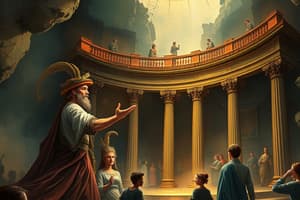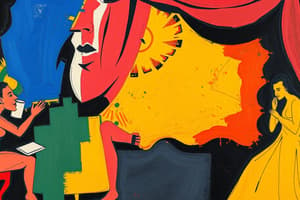Podcast
Questions and Answers
What is the 1st era of theatre?
What is the 1st era of theatre?
- Primitive Theatre (correct)
- Medieval
- Greek Theatre
- Roman Theatre
What is the 2nd era of theatre?
What is the 2nd era of theatre?
- Renaissance
- Medieval
- Restoration
- Greek Theatre (correct)
What is the 3rd era of theatre?
What is the 3rd era of theatre?
- Roman Theatre (correct)
- Renaissance
- Primitive Theatre
- Medieval
What is the 4th era of theatre?
What is the 4th era of theatre?
What is the 5th era of theatre?
What is the 5th era of theatre?
What is the 6th era of theatre?
What is the 6th era of theatre?
What is the 7th era of theatre?
What is the 7th era of theatre?
What is the 8th era of theatre?
What is the 8th era of theatre?
What are the periods of the Renaissance?
What are the periods of the Renaissance?
What play was written during the period of Primitive Theatre?
What play was written during the period of Primitive Theatre?
What must the unities of time, place, and action occur within?
What must the unities of time, place, and action occur within?
Who gave us the unities of time, place, and action?
Who gave us the unities of time, place, and action?
What was the goal of Medieval Theatre?
What was the goal of Medieval Theatre?
What are the 3 types of plays in the Medieval period?
What are the 3 types of plays in the Medieval period?
Mystery plays are also known as?
Mystery plays are also known as?
What is a popular morality play?
What is a popular morality play?
What are Miracle plays about?
What are Miracle plays about?
Who was Aristotle?
Who was Aristotle?
Who was Horace?
Who was Horace?
Name the 3 Tragedians.
Name the 3 Tragedians.
Who were the 3 major playwrights of the Roman era?
Who were the 3 major playwrights of the Roman era?
Who wrote Comedy during the Greek period?
Who wrote Comedy during the Greek period?
What are the parts of a tragedy according to Aristotle?
What are the parts of a tragedy according to Aristotle?
What are Aristotle's 6 elements of theatre?
What are Aristotle's 6 elements of theatre?
Who is known as a writer of tragedy?
Who is known as a writer of tragedy?
What was the Romans' contribution to world theatre?
What was the Romans' contribution to world theatre?
What are some forms of popular entertainment in Roman theatre?
What are some forms of popular entertainment in Roman theatre?
Who said the purpose of drama was to profit & please?
Who said the purpose of drama was to profit & please?
Who created the 3-actor rule?
Who created the 3-actor rule?
What is the significance of the Abydos Passion Play?
What is the significance of the Abydos Passion Play?
Flashcards are hidden until you start studying
Study Notes
Primitive Theatre
- Earliest era of theatre, known as African Theatre
- Significantly influenced later theatre styles
- Example of a notable play: Abydos Passion Play, which proves the existence of theatre in Africa prior to the Greeks
Greek Theatre
- Marked the beginning of western theatrical tradition
- Introduced significant figures including philosophers and playwrights
- Important playwrights: Aeschylus, Sophocles, Euripides, known for their contributions to tragedy
Roman Theatre
- Developed from Greek influences but distinct in its focus on entertainment
- Major playwrights include Plautus (comedy), Terence (comedy), and Seneca (tragedy)
Medieval Theatre
- Focused on spreading Christianity
- Featured three main types of plays:
- Mystery (Cycle plays)
- Morality plays, with "Everyman" as a famous example
- Miracle plays that revolve around saints
Renaissance
- A revival of classical knowledge and culture with its own distinct periods:
- Italian Renaissance
- English Renaissance (Elizabethan Period)
- French Renaissance (Neoclassical Period)
- Spanish Renaissance (Spanish Golden Ages)
Restoration
- A period characterized by the return of Charles II to the English throne
- Marked by increased theatrical productions and the emergence of new styles
19th Century (1800s)
- Known for various movements and significant advancements in theatre
- Transition from traditional forms to more experimental theatre
20th Century (1900s)
- A time of radical changes and diverse theatrical movements
- Introduction of modernism and experimentation in narratives and styles
Unities of Time, Place, and Action
- Key principles established by the Italians for dramatic works
- Require actions to occur within a 24-hour timeframe, at a single location, and to remain focused on a main plot without subplots
Aristotle's Contributions
- Defined core elements of theatre:
- Plot
- Character
- Theme
- Language
- Rhythm/Music
- Spectacle
Horace's Influence
- Affirmed the purpose of drama as both profitable and pleasing
- Established the three-actor rule, promoting efficiency in performances
Popular Entertainment in Roman Era
- Included gladiator fights, public executions, and chariot races
- Served as major forms of entertainment, reflecting society’s values
Tragedy Structure
- According to Aristotle, consists of several components:
- Protogus
- Parados
- Episodes and choral interludes (1st, 2nd, and 3rd)
Important Theatrical Figures
- Greek playwright Aristophanes known for comedy
- Romans made significant contributions to popular entertainment and drama
- Seneca recognized for writing tragedies and influencing later literature
Studying That Suits You
Use AI to generate personalized quizzes and flashcards to suit your learning preferences.



